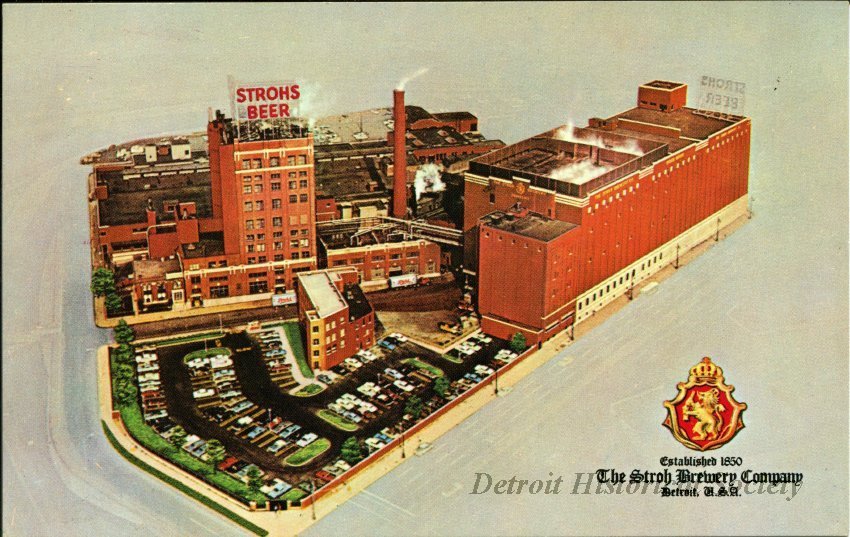Bernhard Stroh arrived in Detroit with two generations of German brewing experience behind him. In 1850, he began creating beers for the city’s large German-born population and within a decade he was successful enough to expand into new facilities on the city’s east side, near Gratiot Avenue. His family was destined to remain in the brewing business for 149 years.
The firm was known as the Lion Brewing Company from 1875 to 1885, before permanently returning to the family moniker. By the turn of the century the Stroh Brewery Company was the largest beer producer in Detroit, producing 300,000 barrels annually. In 1914, the company adopted the fire brewing process that became its trademark, opening an efficient and beautiful new brewhouse featuring huge copper kettles.
When the Prohibition Era arrived, the corporate name was changed to Stroh Products Company, removing the connotation to alcohol. They produced a no-alcohol lager, commonly called “near beer,” and various “mixers” that included birch beer, ginger ale, club soda, cola and orange soda. They also produced malt syrups, ostensibly for baking, but almost certainly used mainly for home brewing. When prohibition was repealed in 1933, the Stroh Brewery Company was back in business immediately, having never stopped producing beer, as other Detroit breweries had done. Stroh’s near beer was actual beer run through a de-alcoholizing process. Following repeal, they were able to simply bottle the full-strength product once again.
Only one non-beer product from that period remains in production – Stroh’s Ice Cream. Originally marketed as Alaska brand, this frozen confection meshed well with the brewing business and equipment. The company’s obsession with quality resulted in a superior dessert that can be found in stores and ice cream parlors today.
In 1979, the Stroh family purchased the riverfront Parke-Davis complex, which they restored and named Stroh River Place. Through the late 20th century, the Stroh Brewery Company survived while other Detroit stalwarts, like Schmidt, E&B, and Pfeiffer failed. Innovation, brewery acquisitions, and business savvy allowed the company to prosper, eventually becoming the nation’s third largest brewing firm. However, in 1985 the Detroit plant on Gratiot was closed, due to inefficiency. Competition forced the family to sell the company in 1999 to the Pabst Brewing Company and the Miller Brewing Company. In 2016, the Stroh brand was revived in conjunction with Corktown’s Brew Detroit, offering several styles of beer including the original Bohemian-Style Pilsner.

